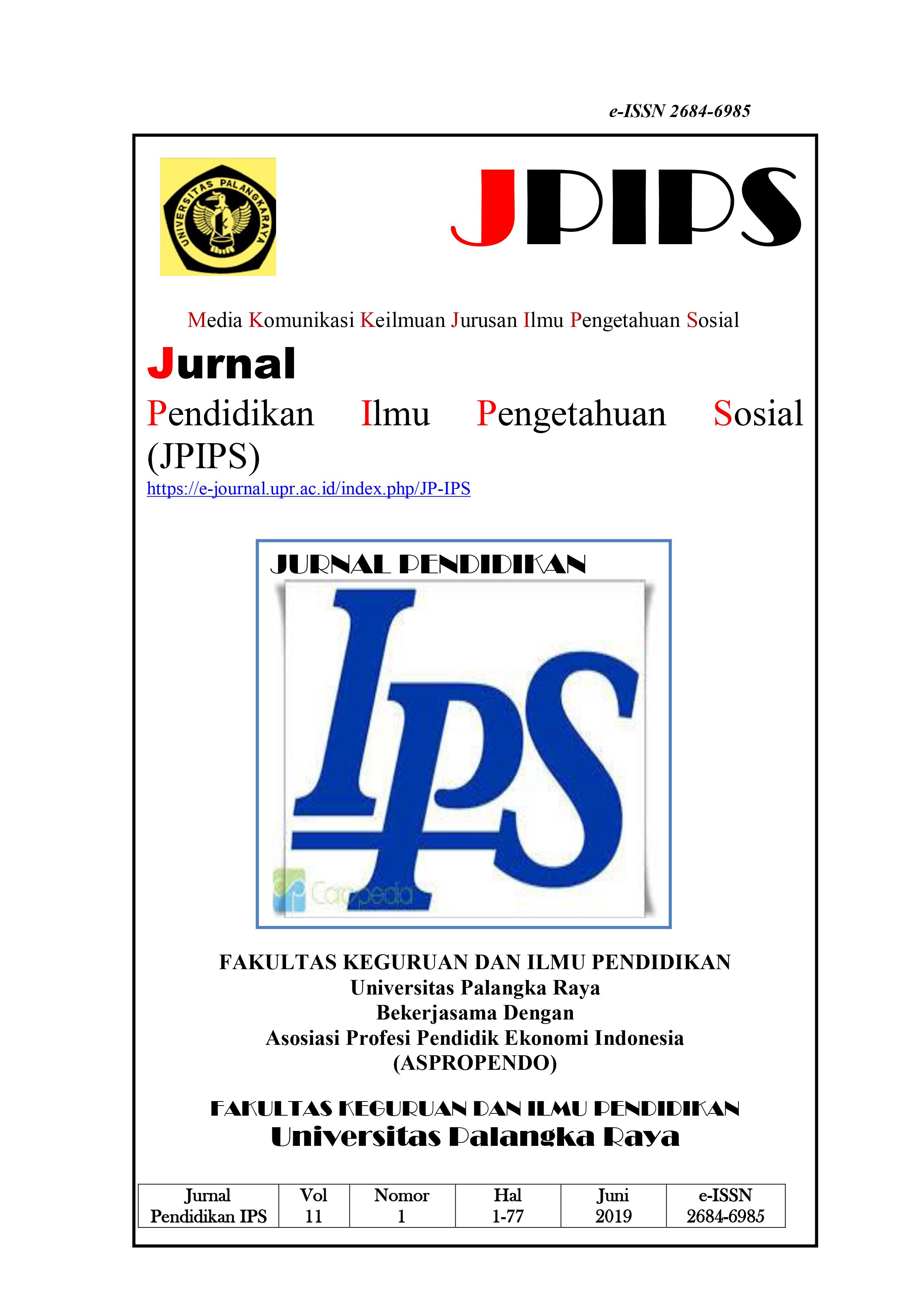Snackfruit Village Festival: A Study of the Revitalization of Local Cultural Values from an Ethno-Social Perspective
DOI:
https://doi.org/10.37304/jpips.v17i1.21255Keywords:
Ethno social, Local wosdom, Cultural Revitalization, TraditionalAbstract
Local cultural wisdom in each region is unique and different; this is why it is important to maintain it. It indicates the unique characteristics of an area, including its social field. The distinctive social culture in each region generally adheres to positive teachings and is worth preserving. This research aims to explore how the snakefruit village festival functions as a tool to maintain and celebrate cultural identity and local wisdom. This research is qualitative research with an ethno-social based phenomenological approach. Data collection is done through observation, in-depth interviews, and documentation studies, as well as through local figures and residents. Data triangulation is carried out through source triangulation. The research results show that (1) internalizing character values is carried out through five stages: value acceptance, response, selection, internalization, and actualization. On the other hand, the character values that emerge as a form of internalization of the local wisdom of the Snakefruit Village festival include religious values, cooperation, tolerance, and caring for the environment. (2) the community has three forms of social capital, Bonding, Bridging, and Linking, which are forms of community cooperation through various parties for the event’s success. The implication of the results of this research is the need for continuous support in developing and promoting the Snakefruit Festival as a manifestation of cultural values in Rengel Village through collaborative efforts between the government, cultural actors, and the community. In this case, the Snakefruit Festival can effectively strengthen and expand understanding and appreciation of Javanese cultural identity in Rengel Village, Tuban Regency
Downloads
References
Brata, I.B. (2012) “Kearifan Budaya Lokal Perekat Identitas Bangsa,” Jurnal Bakti Saraswati, 5(1), pp. 9–16.
Fadilah, S.I., Sriyati, S. and Irawan, T.M.I.A. (2023) “Kajian Dieng Culture Festival sebagai Implementasi Etnopedagogi Materi Biologi pada Kurikulum Merdeka,” Jurnal Ilmiah Pendidikan Biologi , 9(4), pp. 80–94. Available at: https://online-journal.unja.ac.id/biodik.
Hamimah et al. (2022) “Feasibility of the Ethno Social Learning Model for Elementary Children,” Jurnal Ilmiah Sekolah Dasar, 6(3), pp. 550–557. Available at: https://doi.org/10.23887/jisd.v6i3.51304.
Indah Mar’atus Sholichah, Dyah Mustika Putri and Akmal Fikri Setiaji (2023) “Representasi Budaya Banyuwangi Dalam Banyuwangi Ethno Carnival: Pendekatan Teori Representasi Stuart Hall,” Education : Jurnal Sosial Humaniora dan Pendidikan, 3(2), pp. 32–42. Available at: https://doi.org/10.51903/education.v3i2.332.
Khanifatul Mukaromah (2020) “Social Capital in Policy : Putnamian’s perspective on Banyuwangi Ethno Carnival,” Journal of Politic and Government Studies, 09(02), p. 12.
Kulsum, U. and Qomariah, N. (2019) “Inisiasi Pembentukan Dewasarejo ( Desa Wisata Salak Jatirejo ): Upaya Peningkatan Potensi Tanaman Salak Di,” (September).
Lionar, U. and Mulyana, A. (2019) “Nilai-Nilai Multikultural Dalam Pembelajaran Sejarah: Identifikasi Pada Silabus,” Indonesian Journal of Social Science Education (IJSSE), 1(1), p. 11. Available at: https://doi.org/10.29300/ijsse.v1i1.1322.
Mathew B. Miles, A. Michael Huberman, J. Saldafia (2014) Qualitative Data Analysis A method Sourcebook 3rd edition. 3rd ed, SAGE Publication, Inc. 3rd ed. Edited by Helen Salmon. California: SAGE Publications, Inc. Available at: http://scioteca.caf.com/bitstream/handle/123456789/1091/RED2017-Eng-8ene.pdf?sequence=12&isAllowed=y%0Ahttp://dx.doi.org/10.1016/j.regsciurbeco.2008.06.005%0Ahttps://www.researchgate.net/publication/305320484_SISTEM_PEMBETUNGAN_TERPUSAT_STRATEGI_MELESTARI.
Pratama and R A (2019) “Studi Pengetahuan Etnososial Guru Sekolah Dasar Di Kecamatan Mersam.” Available at: https://repository.unja.ac.id/7358/1/REPOSITORY_REZA_STUDI PENGETAHUAN ETNOSOSIAL GURU SEKOLAH DASAR DI KECAMATAN MERSAM.pdf.
Ramdani, E. (2018) “Model Pembelajaran Kontekstual Berbasis Kearifan Lokal sebagai Penguatan Pendidikan Karakter,” Jupiis: Jurnal Pendidikan Ilmu-Ilmu Sosial, 10(1), p. 1. Available at: https://doi.org/10.24114/jupiis.v10i1.8264.
Ratnasari, I.O. dan Y. (2018) “ETNOPEDAGOGI DALAM PEMBELAJARAN DI SEKOLAH DASAR MELALUI MEDIA BERBASIS KEARIFAN LOKAL,” jurnal refleksi edukatika, 8(2), pp. 149–154. Available at: https://doi.org/10.33369/joall.v3i1.6538.
Rusmiati, E.T., Firmansyah, Y. and Rohaniah, Y. (2023) “Revitalisasi Nilai-Nilai Agama dan Budaya dalam Kearifan Lokal Sekolah Alam di Sukabumi,” jurnal Abdi MOESTOPO, 6(1), pp. 116–123.
Sadjim, U.M., Muhadjir, N. and Sudarsono, F. (2016) “Revitalisasi Nilai-Nilai Bhinneka Tunggal Ika Dan Kearifan Lokal Berbasis Learning Society Pascakonflik Sosial Di Ternate,” Jurnal Pembangunan Pendidikan: Fondasi dan Aplikasi, 4(1), p. 79. Available at: https://doi.org/10.21831/jppfa.v4i1.7227.
Septiana Widya Pangesti, A.S. (2020) “Upaya Pengembangan dan Pelestarian Kearifan Lokal Melalui Kegiatan Festival Dawet sebagai Potensi Masyarakat Desa Dibal,” Sabda, 15(1).
Sudirman, S.A., Nurmandi, A. and Bashori, K. (2020) “English writing skills through the perception of siri’ cultural values: Optimism, social support, and academic self-efficacy,” Cakrawala Pendidikan, 39(2), pp. 242–256. Available at: https://doi.org/10.21831/cp.v39i2.26118.
Suksmawati, H. et al. (2019) “Dialog Globalisasi Dan Identitas: Studi Kasus Festival Bancakan Salak Di Jombang,” Prosiding Conference on Research and Community Services, 1(1), pp. 688–694.
Suyitno, I. (2013) “Pengembangan Pendidikan Karakter Dan Budaya Bangsa Berwawasan Kearifan Lokal,” Jurnal Pendidikan Karakter, 3(1), pp. 1–13. Available at: https://doi.org/10.21831/jpk.v0i1.1307.
UU no 32 (2009) UU no 32 tahun 2009.
Widianto, A.A. and Lutfiana, R.F. (2021) “Kearifan Lokal Kabumi: Media Internalisasi Nilai-Nilai Karakter Masyarakat Tuban Jawa Timur,” Satwika : Kajian Ilmu Budaya dan Perubahan Sosial, 5(1), pp. 118–130. Available at: https://doi.org/10.22219/satwika.v5i1.15929.
Yusnia, I. (2024) “Penerapan Tari Jenang Berdasar Perspektif Etnososial Pada Buku Pelajaran IPAS Kelas IV Kurikulum Merdeka,” Madani: Jurnal Ilmiah Multidisiplin, 2(9), pp. 128–132. Available at: https://jurnal.penerbitdaarulhuda.my.id/index.php/MAJIM/article/view/2768.














